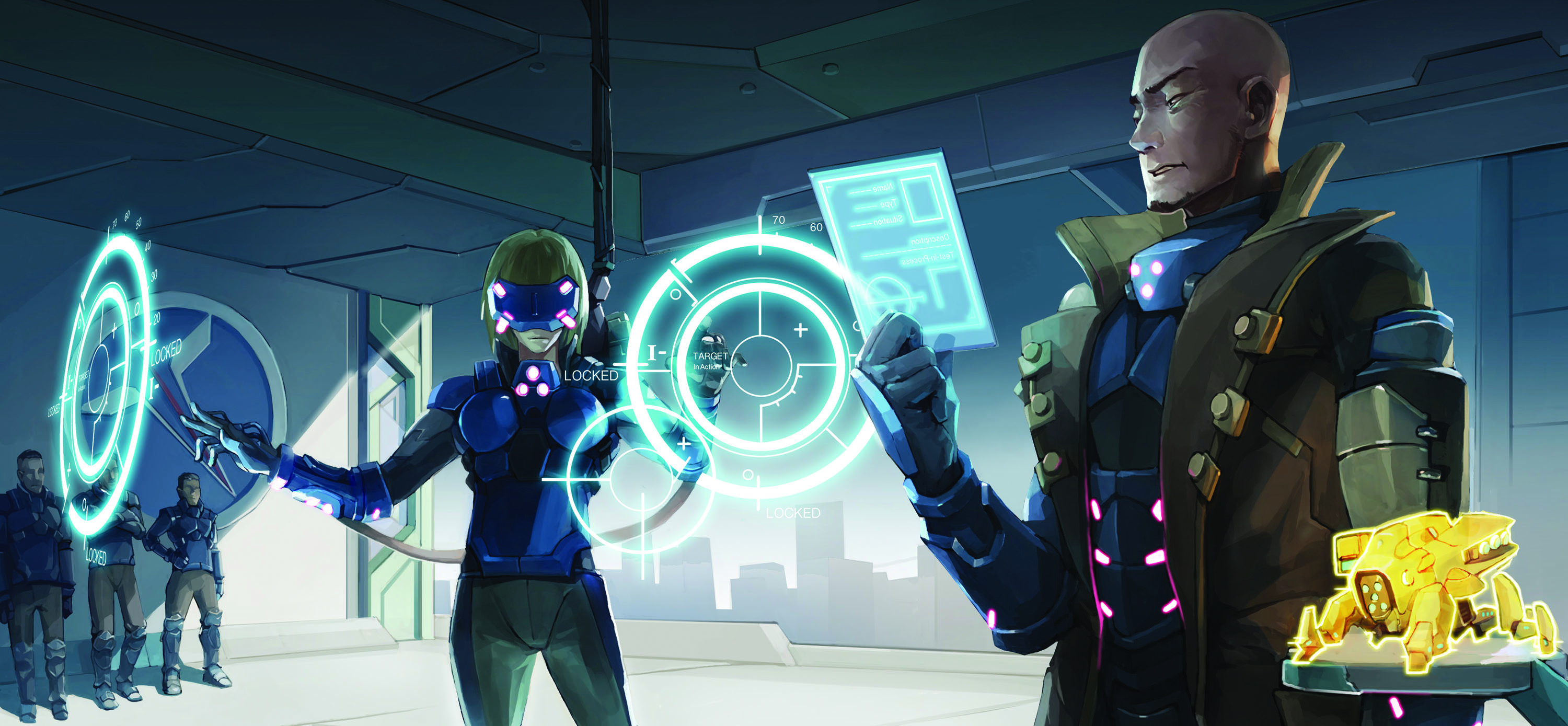
On page 33 of the Infinity roleplaying game, there is an “Advanced Rule” in a box:
As an advanced rule, instead of using a group pool for saved Momentum each PC can save Momentum and use it later individually. Players who have saved Momentum can spend it at any time to assist the actions of other player characters (or NPC allies) and otherwise influence the scene. At any given time, a player can save a maximum of six Momentum. In addition, any single action can benefit from a maximum of six saved Momentum. (For example, if two players had both saved four Momentum each, they still wouldn’t be able to spend all eight Momentum on a single action.) During Momentum depletion, each character loses 1 Momentum.
This is presented as an optional rule, but the truth is that, in my opinion and based on countless hours of playtesting, it is the only way that people should be playing the 2d20 System.
Let’s back up for a second and talk about how Momentum works in the 2d20 System, which was created by Jay Little for Mutant Chronicles and then also used in Infinity, Conan, John Carter of Mars, and Star Trek Adventures. When you resolve an action test in 2d20, you determine a target number based on Attribute + Skill and then you roll a pool of d20 dice — generally starting with 2d20, but expandable to 3d20, 4d20, 5d20, etc. You generate one success per die that rolls under the target number, plus an additional success if the roll is under the pertinent skill’s Focus. (So even if you’re only rolling 2d20, you’re often capable of generating up to four successes.) You succeed on the check if you score a number of successes equal to the difficulty of the task — so if the difficulty is 2, you need to generate two successes to succeed.
Here’s the final wrinkle: If you score MORE successes than you need to succeed at the task, those extra successes are converted into Momentum, which can be spent to enhance the current action or saved and spent later to gain bonuses to future checks, create obstacles for opponents, and other special effects.
At first glance, this seems fairly unremarkable. But in actual practice, it’s a really interesting system to GM for. As I wrote in the GM advice section of Infinity:
…setting a precise difficulty level is not a significant feature of the game. In fact, at least 95% of the time you will basically be deciding whether a task is of Average (D1) difficulty or Challenging (D2) difficulty. (The higher difficulty ratings of Daunting, Dire, and Epic obviously exist, but can be incredibly difficult or even impossible for some characters to achieve under normal circumstances. As such, they should be rare in their application.)
The reason for this is because the Infinity system is far less interested in the simple binary of passing or failing a check, and is instead intensely interested in the quality of your success, which is measured and leveraged through the use of Momentum.
So whereas a GM running D&D or Numenera or Feng Shui 2 is often giving a lot of thought to what the specific numerical value of difficulty for a particular test should be, the GM of a 2d20 game is instead generally just asking, “Is this check unusually hard?” If yes, then difficulty 2. If no, then difficulty 1. The mechanical focus of the game is (or, at least, should be) all in how Momentum is used after the check.
GROUP vs. INDIVIDUAL MOMENTUM
This brings us to saving Momentum. As noted, any Momentum generated by a check that isn’t immediately spent can instead be saved to be used in the future. The mechanical difference we’re talking about is whether you:
- put your saved Momentum into a group pool, from which any player can pull Momentum to spend; or
- put your saved Momentum into a personal pool which you control
The distinction between these points has little or no impact on game balance. Personal pools can theoretically allow a group to save more total Momentum, but in practice this rarely happens, it’s counterbalanced by the fact that every pool ablates a point of Momentum at the end of each scene (so the group loses saved Momentum faster), and the amount of saved Momentum that can be spent on a single check is capped at the same amount.
(We also playtested a variant which was completely equivalent mechanically: Total saved Momentum in the group is capped at 6 and the group collectively chooses which saved Momentum is lost during scene ablation. This makes bookkeeping more complicated and also tends to result in a pointless little “Momentum dance” where players spend their saved Momentum in order to open up cap space for the current player to save their Momentum.)
So if it’s basically mathematically equivalent, what’s the big deal?
Primarily, off-turn player engagement.
Consider a typical combat system: Everybody rolls an initiative and, when their initiative comes around, they take their turn. What happens when it’s not their turn? They just wait for it to be their turn again. The longer the wait, the more likely it is that they will become bored or tune out.
You can counteract this by giving players off-turn engagement. I discuss one example of this in The Design History of Saving Throws: D&D saving throws mechanically engage a player (i.e., let them roll dice) when it is not their turn. It’s a very basic form of engagement and doesn’t involve player agency, but it is physically engaging and that’s enough to break up the routine “it’s not my turn” cycle of tuning out.
When you used a group pool of saved Momentum that anyone can pull from, the player generating that Momentum gives up ownership of it. The only player engaged when the Momentum is used is the active player who is choosing to pull from the pool.
But if you use personal pools, then the player who controls the saved Momentum has off-turn engagement when they spend it to help the active player. This is off-turn engagement with the dial turned all the way up, because even when they’re not actively spending Momentum, the player is constantly looking for the opportunity to do so.
The other factor here is ownership. When a player dumps Momentum into a group pool it is almost immediately anonymized. When that Momentum is later spent by another player, the original player doesn’t feel any ownership over that; they don’t feel the direct connection between the thing that they did and the thing that the current player is doing. When Momentum is spent from a personal pool, on the other hand, the player has immediate and visceral agency. This usually also bleeds into the game world, with the player spending the Momentum explaining how their character is actually contributing to the current action.
This sense of collective contribution to success creates a group camaraderie that, once again, tends to transcend the specific moments in which Momentum is spent: The group is mechanically encouraged to view their successes collectively and take action collaboratively instead of focusing on individual accomplishments.
DESIGN HISTORY
So if I feel this strongly about personal pools being the correct approach for Infinity, why is it pushed off into an optional sidebar?
That’s a complicated question.
When I first became the Lead Developer for the Infinity RPG, the only 2d20 game in print was Mutant Chronicles. I was handed a mechanically complete lifepath system (that needed setting content slotted into it, but should otherwise not be touched) and a half-finished system that needed to be finished. So I spent a couple of months doing that and then turned my attention to  developing the setting material for the core rulebook and the scenarios for Adventures in the Human Sphere, Quantronic Heat, and other supplements.
developing the setting material for the core rulebook and the scenarios for Adventures in the Human Sphere, Quantronic Heat, and other supplements.
It was at this point, however, that the development process hit several problems. Basically, right around the time that I was declaring Infinity to be “system locked” (like picture lock for a film, I think of system lock as being the point where the mechanics are nailed down to the point where you can confidently develop supplementary material) there was a simultaneous project inside Modiphius to develop an internal 2d20 SRD that would create consistency between all published versions of the game.
In developing the Infinity version of the 2d20 System there were a couple key design principles I had established.
First, because we were going to be developing full-fledged systems for Warfare, Infowar, and Psywar, I felt it was important to streamline and simplify the core of the system. The complexity of the game would come from having these robust scenario/game structures, and therefore other sources of complexity in the system should be smoothed out.
Second, the 2d20 System in Mutant Chronicles — like the pre-Genesys system Little had designed before it — features a set of core mechanics designed to empower players and give GMs tools for making powerful, robust rulings, but then surrounds those mechanics with a ton of mechanically crunchy specificity. The core mechanics of the Momentum system, for example, are beautifully designed to empower player creativity and improvisation, but then the system works relentlessly to lock that down by providing a laundry list of specifically defined ways that you’re allowed to spend the Momentum. My own design predilections, on the other hand, lean the other way: Ditch all the hand-holding and just leave the powerful core structures.
These two principles worked well with each other: Focusing on cruft-free core structures simultaneously simplified the mechanical core so that it could be developed through the new functionality of Infowar and Psywar rather than a lot of situational rules.
But the principles didn’t work well with the new guiding principle of unifying all 2d20 System design to match the new SRD. The result was a tug of war for the heart and identity of the game, complicated immensely because we had a dozen freelancers working on supplemental material that had to be constantly revised every time the core mechanics were violently yanked in a new direction.
I won some of those battles. I lost others. In the end, the only way I could keep the personal Momentum pools that I felt so passionately about in the game was as an optional rule, and even that was a fight.
But, seriously, if you’re running a 2d20 game — any 2d20 game! — swap to personal Momentum pools.

Buy!















